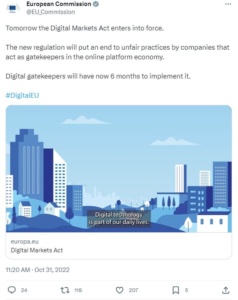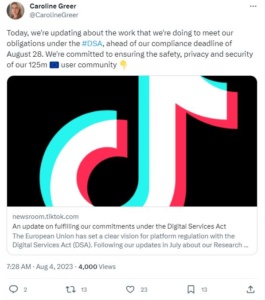How do you regulate something as vast, powerful, and ever-changing as the internet?
Part of the EU’s answer to this question is its Digital Markets Act (DMA), which seeks to take on some of the most powerful and wealthy companies in human history. Just the other week, the European Commission labelled the likes of Google, Amazon, Apple, Meta, ByteDance and Microsoft “gatekeepers” who are covered by the legislation and triggered the scramble to alter and, in some cases, transform services so they comply. Notably, X (formerly Twitter) was not on the list. So how will it change the internet, and will those changes be for the better?
The DMA was signed into law in 2022 and the 22 companies it targets have until 6th March 2024 before enforcement begins. There are 44 million users of their services in the EU and many of the changes will impact British users, too, and are likely to inform our own regulation currently going through parliament.
The legislation’s aim is to enforce and export the European Commission’s definition of fair competition, consumer choice, and “safeguarding in the digital economy” and it tackles political hot topics like misinformation, political interference, and even the misuse of artificial intelligence (AI.) Commission officials want to make it easier for Europeans to switch between competing services, manage their data, and report misuse and “harmful” content. Tech companies would not deny that they also want to fight for a fair, safe, and competitive internet but oftentimes they argue the EU’s definition, understanding, and chosen method of achieving this is wrong and even counterproductive. The US, and the UK to a lesser extent, interpret online safety and open competition differently.
Western nations have, until recently, mostly failed in their attempt to regulate the internet, primarily because policymakers and legislators are significantly less digitally advanced than the tech firms they are trying to rein in. They are outgunned and, often, outsmarted. When I was a Reach PLC reporter, I broke the news that parts of the UK’s own Digital Economy Act 2016 were to be delayed. The government wanted “age verification checks” on internet browsers, but when we broke the news that Google Chrome would follow Mozilla Firefox and run their service through “DNS encryption” to evade the law, we knew it would be rendered meaningless and it was a just a matter of time before the government backed down.
I put this to the Internet Service Providers Association and after some debate, they were forced to admit the new law would be “unenforceable” and a delay was needed. We published this and put it to the government and, a few months later, they dropped the provision altogether. Eventually, large parts of the Digital Economy Act – including age verification – were amended or abandoned entirely in favour of a broader “duty of care” for all websites, which is contained in its successor bill, the Online Safety Act; this is currently battling its way through Parliament as part of the same government agenda to tackle “online harms”.
The EU, however, has better form in this area. Data protection law as we know it comes entirely from the EU’s GDPR legislation and you interact with it every time you open a webpage and are forced, on every single website you use, to click “accept cookies”. More recently, the bloc has forced Apple to adopt the USB-C charging port instead of its custom lightning cable as part of the push for “fair competition”. The Commission has made it clear they are up for the fight to enforce the DMA, and have become entrenched, to the point that some insiders at major tech firms are worried that they are not listening to reasonable concerns or taking note of research and insights provided by campaigners and lobbyists. Some fear social media in the bloc will lose its innovative edge, its 44 million users will be disadvantaged, and tech companies and investments will be driven elsewhere.
But the DMA comes with serious teeth—Including the threat of whopping fines and even the potential to force companies to sell off parts of their business just to operate in Europe—and firms are moving fast to comply.
And to a large degree, the Commission won the argument before the law had even been introduced. Most visibly for many, the social media giant TikTok, owned by Chinese-firm ByteDance, pre-emptively transformed its service in response to the impending laws. There is now an option to opt out of their signature algorithm (or “personalisation”, as the EU calls it) which harvests data on you and learns what videos you like, and therefore makes the app unique. The algorithm is arguably the heart and soul of the app and is why it was able to outcompete Instagram and introduce a new form of inexplicably entertaining videos (known as Reels, Shorts or Swipe videos to many) to millions of us during lockdown. Now, in the “For You” and “LIVE feeds” on TikTok, you can choose to see only popular content and content from people you choose to follow—a bit like Instagram in the old days.
So what else, specifically, is likely to change?
Google:
- Easier switching: Google will offers users more opportunities to switch platforms and manage their data and remind users of these choices.
- Increased Transparency: Google may have to provide more transparency regarding its advertising practices and algorithms.
- Fair Ranking: To comply with anti-self-preferencing rules, Google may have to adjust how it ranks its own services and those of competitors in search results.
Amazon:
- Marketplace Fairness: Amazon is likely to be required to ensure a “level playing field” for third-party sellers on its platform, potentially leading to changes in its seller policies.
- Data Access: The DMA may require Amazon to provide better data access and interoperability (compatibility and ability to interact with other services) for third-party sellers.
Apple:
- App Store Pricing: Apple is facing scrutiny over its App Store policies which will likely lead to changes in its fee structure and review process, giving app developers more power.
- New App Stores: Apple (and Google, in fact) will be forced to allow new ways to download apps by providing space for third-party app stores on their respective iOS and Android devices.
Meta:
- Data Portability: To comply with data portability (ability to identify and move your data) requirements, Meta may have to make it easier for users to move their data to other social media platforms.
- Interoperability: The DMA might require Meta to facilitate interoperability (compatibility and ability to interact) with other social networks, enabling users to communicate across different platforms. There is some uncertainty here, but this could mean WhatsApp, for example, interacting with other messaging services like Telegram.
ByteDance:
- Algorithm (“Personalisation”) Opt-out: TikTok has already chosen to allow users to choose not to use its renowned personalisation algorithm.
- Content Moderation: ByteDance may need to strengthen its content moderation practices to comply with rules against illegal and so-called “harmful” content.
- Algorithm Transparency: The DMA requires more transparency in TikTok’s recommendation algorithms to avoid favouring its own content.
Microsoft:
- Browser Choice: Microsoft’s Windows operating system may need to provide users with more choice in selecting their default web browsers and search engines.
- Market Dominance: Microsoft’s position in certain markets, such as productivity software, may come under scrutiny for potential anticompetitive practices.
Some of the companies designated as “gatekeepers” last week—including Amazon—are still arguing that they do not in fact fall into the category. The Commission is also investigating if Apple’s iMessage app as well as Microsoft’s Bing, Edge and Microsoft Advertising services are covered, and X was not deemed to be a gatekeeper despite widespread calls for it to be regulated. So, there is a chance the scope of the act will change before enforcement begins next year.
Another interesting feature of the law is how it is enforced. Unlike GDPR, it will be enforced by the Commission, not individual member states. Companies will have to decide how to interpret and introduce the rules alongside their own terms of service. They are then required to perform independent audits and send them to the European Commission.
There remain many questions about how this process will play out in practice and to what extent the lawyers and campaigners who work for the big tech companies will be able to push back and minimise its impact. The DMA is well and truly a world first, and a step into the unknown for the internet.
My guess is we will not see users using the DMS provided provisions much. They won’t be switching platforms in large numbers or turning off “personalisation”. Users accept algorithms and data collection because the features and service large amounts of data and smart algorithms make possible are amazing. Big tech firms have made our digital lives so much better, not the EU, and users understand this.





